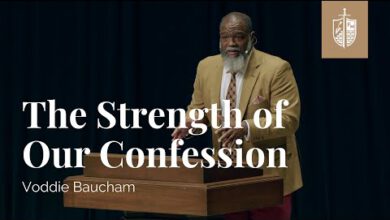Christian Nationalism | Voddie Baucham
Christian Nationalism | Voddie Baucham
Good evening, everyone. As we begin, let me emphasize that these two messages are meant to be understood together. Tom and I have spent a lot of time discussing this, and it was challenging for us to decide how to divide the topic. This difficulty partly stems from what Tom mentioned earlier—namely, that this term has been hard to define, and that’s intentional. The term is deliberately vague because it is used as a pejorative, as an insult. Depending on who’s using it and who they’re targeting, its meaning can shift.
Now that we’ve laid the foundation and you understand the key definitions and players involved, I want to take this discussion to a more practical level. I first encountered this term in 2021, during my winter tour. At that time, Fault Lines was about to be released in the spring. Throughout that tour, I talked a lot about the social justice movement and the rise of “wokeness.” We tried to arrange a few debates, and eventually, we secured one. Even before the debate was set up, I noticed people starting to talk about Christian nationalism. The way it was brought up made it clear that it was being used as a deflection. Social justice ideology had gained widespread influence, especially around 2020-2021, when it was everywhere—on social media, during Black Lives Matter marches, and in people’s public statements.
However, by 2021, pushback against this movement started to emerge. The Dallas Statement was released, and people began to take clear stances on social justice and the gospel. A legitimate movement arose, with people arguing that social justice was unbiblical and even a Trojan horse designed to promote an ideology incompatible with biblical Christianity. This pushback created a space for debate—something that was nearly impossible earlier, especially after the death of George Floyd, when those who disagreed with the mainstream narrative were quickly silenced. But now, with more room for discussion, the conversation shifted toward Christian nationalism.
At that point, I started hearing people ask, “What is Christian nationalism?” Some people were genuinely concerned, particularly those who didn’t fully understand what it meant or hadn’t encountered it before. I remember thinking, “Maybe I should look it up.” As I did, articles started appearing, and prominent voices—like those Tom mentioned—began discussing it. One of the major works was Jesus and John Wayne, a book that criticized Christian nationalism. I decided to read it to better understand the conversation.
At first, I wasn’t sure what to make of the term. My initial reaction was to consider that there might be some truth in what people were saying. For context, early in my ministry, I worked at a church where the Bible and the cross were often wrapped in the American flag. You know the type: churches that celebrate the armed services by parading flags from the military branches, playing military theme songs, and honoring service members during worship services. This happened in the Lord’s House, on the Lord’s Day. While I respect those who serve in the military (my own family has a history of service), I found myself questioning the blending of patriotism and faith in such an explicit way.
